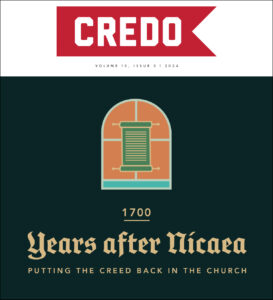Since 2018, God has blessed my academic endeavors through the means of teaching opportunities (none of which I take for granted!). The majority of my time teaching has been spent with students pursuing a master’s degree, but I have also spent time behind the lectern in collegiate and doctoral settings. The task of teaching can be intimidating, especially when you are not far removed from these courses yourself. My most challenging teaching assignment, however, fell into my lap in August of 2024 – three classes made up of seventy 10th graders. I used to think teaching adults was intimidating, but after spending the majority of my day with 15 and 16-year-olds, I find that fewer things can scare me.
This change came about due to some painful providence. My wife, sons, and I recently moved from Kansas City, MO to Jackson, MS due to a family illness. I stepped away from Midwestern and Spurgeon College, not knowing if new teaching opportunities would be in my future or if that part of my life was coming to an end. In God’s kindness, an opening became available at a Covenant Christian K-12 school just weeks before my family set off for Mississippi. My role at Hartfield Academy has both administration and teaching responsibilities, but the middle of my day is dedicated to teaching our 10th graders “Intro to Theology.”
Now, the last time I was around 10th graders on a daily basis was probably in 2006, when I was in 10th grade myself. I knew my daily schedule would be different, but I had no way of knowing the extent of differences between a high school and post-graduate classroom. For the first time in my teaching career, I was met with an audience that did not volunteer to take my class, and I quickly had to assess my students’ prior knowledge in order not to overwhelm them with theological and academic jargon. Furthermore, I went from being roughly the same age as my students to an old man in the span of two months. I used to think I was funny, but now I know better.
It goes without saying that I was faced with a significant learning curve (and I’m sure my students will testify that I’m still learning and have much more to learn). I am encouraged to report, however, that the kids might be all right. I did not know how the Bible department at Hartfield Academy was structured, and I had no prior knowledge of high school environments on which to base my lesson plans. So, I picked what I believed to be a reasonable starting place for our studies – the Ecumenical Creeds. The faculty were enthusiastically supportive of my decision (a good sign!), but I did not know if my students would share their enthusiasm. The school is broadly evangelical and hosts a wide range of denominations. While some of my students recite creeds in church every Sunday, others would be reading them for the first time.
If we tell our children, through both our words and actions, that they are incapable of understanding theology proper, the Trinity, or classical Christology, then they will rest satisfied on broad generalities and caricatures. Click To TweetI started slow – let’s memorize the Apostles’ Creed and look at the biblical argumentation supporting the document. After a while, I felt comfortable with moving on to more difficult topics. Soon, the 10th graders at Hartfield Academy were discussing what it means for the Son to be “begotten.” The Creator-creature distinction became a regular part of classroom discourse. For six weeks, they graciously allowed me to talk about the Trinity, and we did not mince words. “Personal properties,” “Eternal Relations of Origin,” “Inseparable Operations,” and, yes, even terms like “Homoousian” began to fill the air. Now, I do not mean to mislead you – some students reacted more positively to these challenges than others. All of my students, however, demonstrated that they were capable of handling the major ideas of classical Christian theology when given time, patience, and guidance. At times, some students looked at my weekly agendas with despair (“we’re still talking about the Trinity?!?”), but step by step they began to build an appropriate theological framework.
One of my students recently visited my office during a study hall. The head of school made an unannounced appearance and saw a pile of students’ papers on my desk labeled “Athanasian Creed.” The head of school glanced at the stack of ungraded worksheets (I include the adjective so fellow educators can relate to my pain) and asked the student to summarize the main claims of the creed. The pressure was on, but my student rose to the task. Whereas six weeks ago he had not known the creed existed, he could now articulate belief in Trinitarian unity and the distinction of persons. He could discuss the divine “nature,” and explain what the divine persons have in common. He could explain why it is important that the Son receive the divine nature in its totality. I let out a small sigh of relief.
I share this story not to extol my teaching methods. The only reason that I am surviving a 10th grade classroom every day is because I have a team of teachers and administrators to correct my frequent mistakes and encourage my minor victories. I am sure that some of my students would tell you that I am a college professor pretending to understand 15 and 16-year-olds, and others would tell you I am failing to do so entirely. No, my students can understand these concepts in spite of me, and the principle equally applies to our churches. It is common for pastors to preemptively decide what their young students and laymen can handle. While every church is different, and I trust that pastors have a much better assessment of their congregations than I do, I would suggest that many of our congregants can handle more than they think they can. When we determine from the onset that our congregants cannot handle classical theology, we create a self-fulfilling prophecy. If our pastors do not think we can handle it, then why should we?
People believe what you tell them. If a group of people are repeatedly told that classical doctrine belongs in seminaries and ivory towers, then they will eventually believe that those “academic” discussions do not pertain to them. If we tell our children, through both our words and actions, that they are incapable of understanding theology proper, the Trinity, or classical Christology, then they will rest satisfied on broad generalities and caricatures. My time with 10th graders, however, has suggested that the opposite is also true – if you tell them they can handle it, and give them time to struggle, then they might just start to believe it. I doubt you will have universal success, as some people will hit a ceiling before others, and that is fine. The theological standard, however, will begin to shift. Students will begin to expect more of themselves, of their teachers, and of their pastors. If we begin to act like these theological truths are big deals, then we will create environments in which these truths are treated as such.
If they can handle chemistry and calculus, then they can handle Chalcedon. Indeed, they must for the future health of the Church. Click To TweetOne recent morning I walked into my office to find a student waiting on me. This young man is a great student and a tremendous athlete. I could tell that something was on his mind, but I could not have guessed what he wanted to discuss. Apparently, a debate had taken place during baseball practice. Three 10th grade baseball players were hitting off a tee while discussing the relationship between the hypostatic union, the doctrine of God, and the Imago Dei. This conversation had sprung, in part, due to a previous lecture on the Nicene Creed, and the students were attempting to parse how “true God from true God. . . became man.” The conversation was admittedly rudimentary but exceptionally encouraging. If nothing else, an early morning baseball practice sounded a bit more like heaven than it would have otherwise.
I love my students, but they are not super-human. They are your typical 15 and 16-year-olds. They are interested in dating and they struggle with how to relate to their parents. Sometimes they make immature decisions that bring about negative consequences. They can make grown men develop new insecurities based on idiosyncrasies we did not even know we had (ok, “I did not even know I had”). The point is this: they are average teenagers, and average teenagers can handle classical theology. Not all students will fall in love with classical theology, and that is ultimately out of our hands, but given enough attention they can certainly grasp the historic teaching of the Church. If they can handle chemistry and calculus, then they can handle Chalcedon. Indeed, they must for the future health of the Church.


